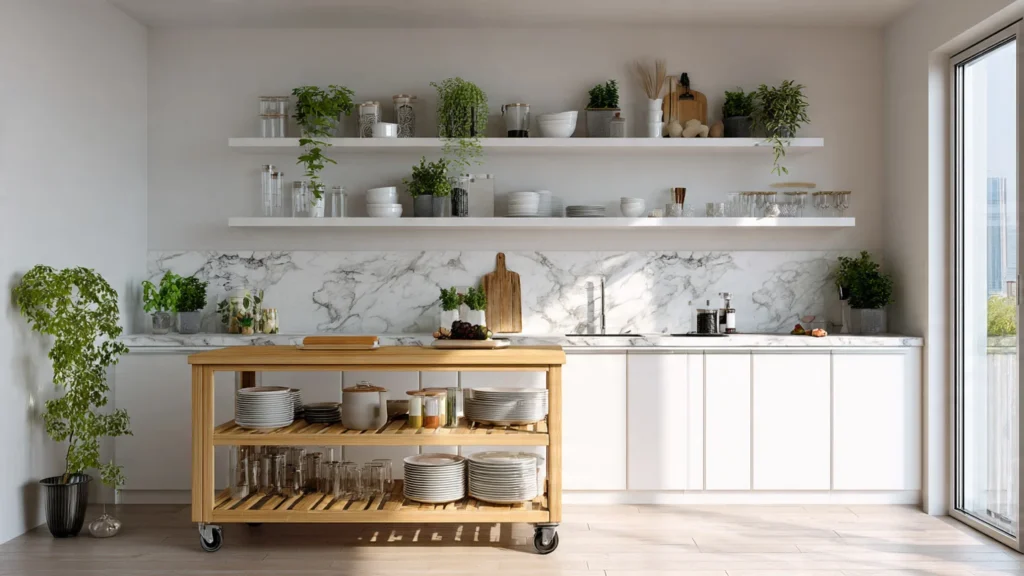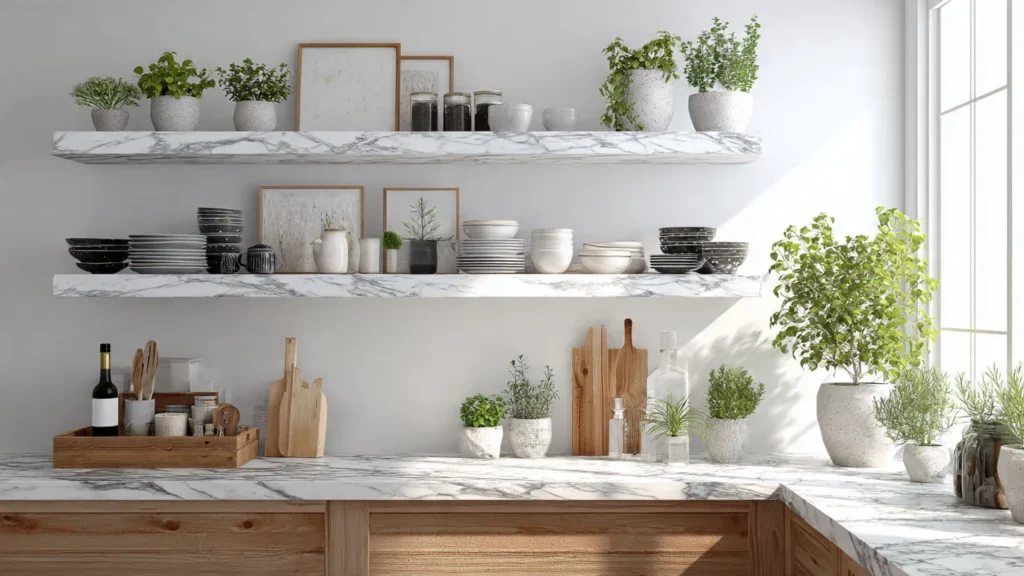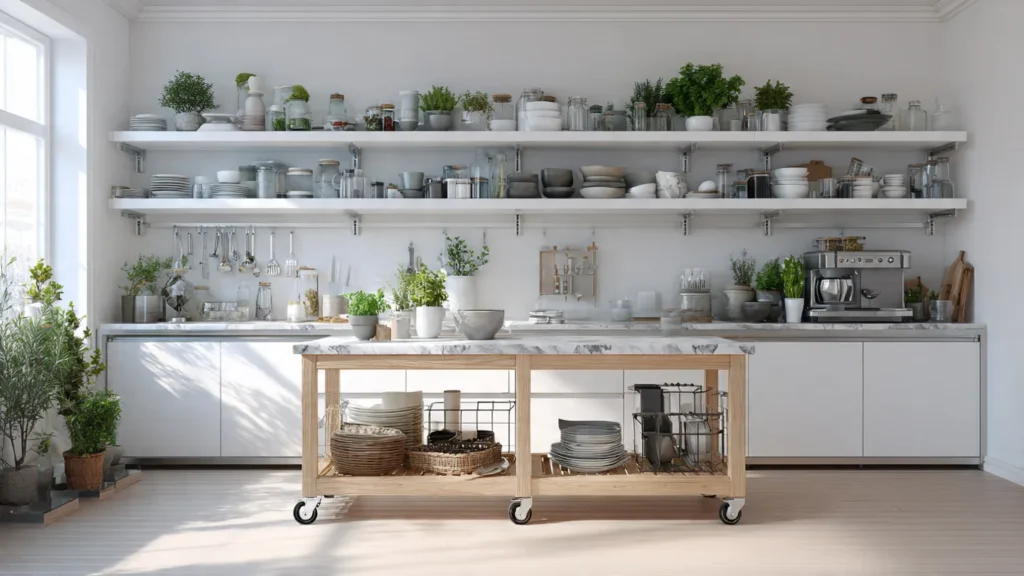Living in a kitchen without cabinets might seem like a design challenge, but it’s actually an opportunity to create a beautiful, functional, and highly organized space. Whether you’re in a rental apartment, embracing minimalist living, or working with a unique kitchen layout, organizing a cabinet-free kitchen requires creativity and smart storage solutions.

In this comprehensive guide, you’ll discover 15 proven strategies to maximize every inch of your small kitchen without traditional cabinets.
Why Some Kitchens Don’t Have Cabinets
Before diving into solutions, let’s understand why you might be dealing with a cabinet-free kitchen:
- Rental restrictions that prevent permanent installations
- Minimalist design choices for an open, airy aesthetic
- Budget constraints during kitchen renovations
- Studio apartments with limited kitchen space
- Temporary living situations requiring flexible solutions
15 Smart Ways to Organize a Small Kitchen Without Cabinets
1. Install Floating Shelves Strategically
Floating shelves are your best friend in a cabinet-free kitchen. Install them at varying heights to create visual interest while maximizing vertical space.
Pro tip: Use deep shelves (12-16 inches) for larger items and shallow shelves (6-8 inches) for spices and small containers.
2. Invest in a Kitchen Cart or Island
A mobile kitchen cart provides instant storage and counter space. Look for multi-tiered carts with:
- Drawers for utensils
- Wine rack sections
- Towel bars
- Locking wheels for stability

3. Utilize Wall-Mounted Magnetic Strips
Magnetic knife strips aren’t just for knives! Use them to store:
- Metal spice tins
- Kitchen scissors
- Metal measuring spoons
- Small tools
This keeps items visible and accessible while freeing up drawer space.
4. Hang a Pegboard Wall
Pegboards offer customizable storage that adapts to your changing needs. Paint it to match your kitchen aesthetic and use hooks to hang:
- Pots and pans
- Cutting boards
- Measuring cups
- Kitchen towels
- Small baskets for loose items

5. Maximize Corner Spaces
Corners often go unused in small kitchens. Install:
- Corner shelving units
- Lazy Susan turntables
- Corner wire racks
- Triangular floating shelves
6. Use Tension Rods Creatively
Install tension rods inside open spaces to:
- Hang spray bottles under the sink
- Create dividers for baking sheets and cutting boards
- Suspend S-hooks for hanging mugs or utensils
7. Add Over-the-Door Storage
The back of your kitchen door is prime real estate. Use:
- Over-the-door organizers with pockets
- Hook racks for aprons and towels
- Wire baskets for cleaning supplies
8. Embrace Open Shelving with Baskets
Combine open shelves with attractive baskets or bins to hide clutter while maintaining accessibility. Label each basket for easy identification:
- “Baking supplies”
- “Snacks”
- “Breakfast items”
- “Tea & coffee”
9. Install a Pot Rack
Ceiling-mounted or wall-mounted pot racks free up significant space and add a professional kitchen aesthetic. Hang:

- Frequently used pots and pans
- Colanders
- Large ladles and spoons
10. Use Stackable Storage Containers
Invest in uniform, stackable containers for dry goods. This approach:
- Maximizes vertical space
- Creates a cohesive look
- Makes inventory visible at a glance
- Keeps food fresh longer
Recommended items: Clear plastic or glass containers with airtight lids.
11. Mount a Paper Towel Holder and Hooks
Under-shelf paper towel holders and adhesive hooks utilize unused space without drilling holes. Perfect for:
- Hanging mugs from under shelves
- Mounting paper towels under open shelving
- Suspending frequently used utensils
12. Create a Coffee and Tea Station
Designate one shelf or cart level as a beverage station with:
- Tiered organizers for coffee pods or tea bags
- A small tray for sugar and stirrers
- Mug hooks underneath
- A small appliance garage for your coffee maker
13. Use Drawer Organizers Efficiently
If you have limited drawers, maximize them with:
- Expandable drawer dividers
- Utensil trays with multiple compartments
- Vertical knife blocks that fit in drawers
- Stackable drawer organizers
14. Install Under-Shelf Baskets
These slide onto existing shelves and create additional storage underneath. Use them for:
- Napkins and paper products
- Plastic wrap and foil
- Small snacks
- Coffee filters
15. Adopt the “One In, One Out” Rule
Without cabinets, you’re forced to be mindful of what you keep. Before buying something new, remove an item you no longer use. This prevents clutter and maintains organization.
Styling Tips for Open Kitchen Storage
Since everything is visible in a cabinet-free kitchen, aesthetics matter:
Color Coordination: Choose a color palette for your storage containers, baskets, and dishware. White, natural wood, and metallics create a cohesive look.
Uniform Containers: Transfer dry goods into matching containers with labels for a curated appearance.
Display Beautiful Items: Showcase attractive dishware, glassware, and cookware as decor. Hide less attractive items in baskets.
Regular Decluttering: Visible storage requires more frequent tidying. Wipe shelves weekly and reorganize monthly.
Essential Items for Cabinet-Free Kitchen Organization
- Floating shelves (various sizes)
- Rolling kitchen cart with storage
- Pegboard with hooks
- Magnetic strips (2-3 for different areas)
- Stackable clear containers with labels
- Wire baskets (small to medium)
- S-hooks and utility hooks
- Tension rods (adjustable)
- Over-the-door organizer
- Under-shelf baskets
Budget-Friendly Organization Hacks
- Repurpose Mason Jars: Use them for utensil holders, dry goods storage, or herb gardens.
- DIY Floating Shelves: Create custom shelves from reclaimed wood and simple brackets.
- Thrift Store Finds: Look for vintage crates, baskets, and containers at secondhand shops.
- Command Strips: Use heavy-duty adhesive strips for temporary, damage-free installations in rentals.
- Shoe Organizers: Clear pocket shoe organizers work perfectly for storing spices, snacks, and cleaning supplies.
Common Mistakes to Avoid
Overcrowding Shelves: Leave breathing room between items for a clean, organized look.
Ignoring Vertical Space: Don’t stop at eye level—use all wall space from counter to ceiling.
Mixing Too Many Styles: Stick to a consistent aesthetic for storage solutions.
Forgetting About Weight Limits: Check weight capacity for floating shelves and ensure proper installation.
Neglecting Lighting: Under-shelf LED strips improve visibility and ambiance.
Maintaining Your Organized Kitchen
Daily Habits:
- Wash and put away dishes immediately
- Return items to their designated spots
- Wipe down visible surfaces
Weekly Tasks:
- Dust shelves and containers
- Check expiration dates on visible food items
- Reorganize items that have shifted
Monthly Reviews:
- Evaluate what’s working and what isn’t
- Donate unused items
- Deep clean all storage areas
Conclusion
Organizing a small kitchen without cabinets is entirely achievable with the right strategies and storage solutions. By utilizing vertical space, embracing open shelving, and investing in multi-functional furniture, you can create a kitchen that’s both beautiful and highly functional.
Remember: the key to successful cabinet-free organization is being selective about what you keep, maintaining consistent aesthetics, and developing daily habits that preserve your organized space.
Start with one area, implement these solutions gradually, and soon you’ll have a streamlined kitchen that works perfectly for your lifestyle—no cabinets required!
Also Read: Small Kitchen Modular Design Ideas: Smart Solutions for Compact Homes
